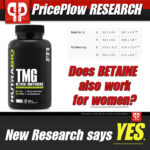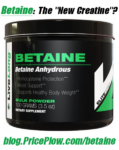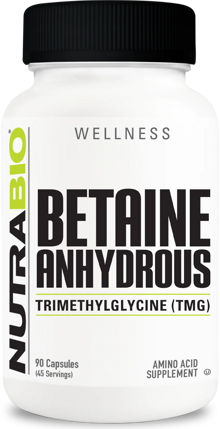Optimal performance starts at the cellular level. NutraBio TMG (Trimethylglycine) delivers 1,000 mg of pure betaine anhydrous per serving to support methylation, energy production, and overall cellular health. Whether your goal is to enhance endurance, improve recovery, or support metabolic function, TMG helps you perform and recover without compromise.
Key Benefits:
- Supports healthy methylation for DNA, liver, and cardiovascular health
- Enhances energy metabolism by promoting optimal NAD⁺ and SAMe levels
- Aids athletic performance by improving strength and endurance output
- Promotes homocysteine balance to support heart and liver function
TMG plays a crucial role in methylation, a process essential for maintaining cellular energy, protein synthesis, and DNA integrity. By donating methyl groups, TMG supports the production of key compounds like creatine and SAMe, helping optimize everything from strength output to mood and recovery.
Athletes rely on efficient energy metabolism to perform at their peak. TMG helps improve power output, endurance capacity, and oxygen utilization, especially when combined with other performance nutrients such as creatine or NMN. Experience stronger lifts, longer sessions, and improved recovery between workouts.
Cardiovascular & Liver Health
Beyond performance, TMG supports healthy liver function and helps regulate homocysteine levels, which are key for cardiovascular and metabolic wellness. Each serving provides 1,000 mg of pure Trimethylglycine to deliver consistent, science-backed support for long-term vitality.
Why Choose NutraBio TMG
NutraBio TMG is made with 100% pure betaine anhydrous, fully disclosed, and third-party tested for potency and purity. Every capsule supports your commitment to performance, recovery, and health without compromise.










